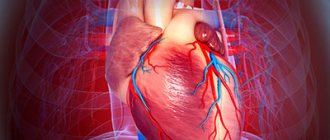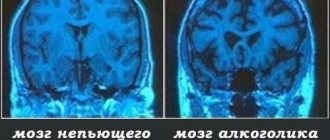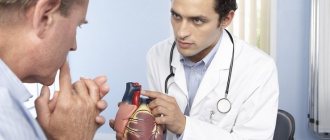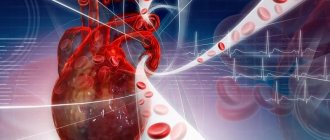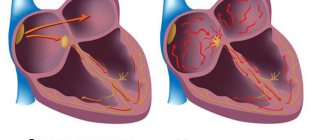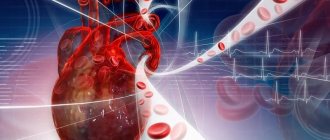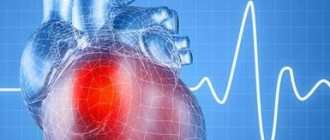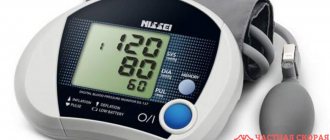Home>Articles>Extrasystole and alcohol
quick menu (hide)
- What is extrasystole?
- Manifestation of the disease
- Features of extrasystole in alcoholism
- Diagnosis of the disease
- Treatment Options
According to statistics, cardiovascular diseases occupy first place as a cause of death - this indicator is typical not only for our country, but also for the whole world. According to other data, this category of diseases is the most common. The list of diseases of the heart and vascular system also includes a variety of pathologies - both congenital and acquired.
It's no secret that heart health is a direct consequence of our lifestyle. It is negatively affected by stress, toxins, infections, somatic diseases and other factors. Bad habits are a particularly dangerous influence that causes significant problems. Since alcohol is available to most of the population, there are many problems with it. Experts have found a direct link between alcohol abuse and heart disease.
What heart problems can alcohol cause?
How are extrasystole and alcohol related? The most common problems are cardiomyopathy, heart rhythm disturbances - in particular, extrasystole. The most frightening fact is that this disease does not spare anyone; it occurs in both teenagers and older people. The disease often makes itself felt suddenly; for many years the patient may not have felt any problems or disturbances.
Every year the number of patients with various heart diseases is growing. What is the reason? What role does alcohol abuse play in this?
News
Alcohol can trigger an arrhythmia attack
Publication date: 06/04/2012, Modification date: 06/04/2012
In a recent study, American scientists were able to discover a strong connection between alcohol consumption and heart rhythm disturbances in patients with atrial flutter, one of the most common forms of arrhythmia. The results of their study will be published in August in the American Journal of Cardiology.
Doctors have noted this relationship before. A separate term was even introduced for it in 1978 - “holiday heart syndrome.” It served to describe the condition of arrhythmic patients who often complained of palpitations after heavy consumption of alcohol during the multi-day New Year and Christmas holidays. As a rule, with the cessation of alcohol abuse, this symptom disappeared. The symptom “palpitation” itself also requires some explanation: of course, heartbeat itself is not a pathology. However, a healthy person, as a rule, does not feel it. Palpitations as a symptom can be described as the patient feeling his own heart beating. It is described as a pounding, fluttering, sinking and jumping heart, and in most cases this symptom is a sign of cardiac dysfunction. In the latest study, which ran from September 2004 to March 2011, researchers surveyed 223 patients with diagnosed arrhythmias, including patients with atrial flutter (133 participants) and ventricular tachycardia (90 participants). Their average age was 59 years. Patients were asked 1 question: “Does drinking alcohol affect your heartbeat?” The answer was a choice of 5 options - never, rarely, sometimes, often, constantly.
After analyzing the responses, the researchers found that excessive drinking, on average, increased the risk of palpitations by an average of 4.5 times in almost all patients suffering from atrial flutter. In most of them, in addition to the subjective feeling of heartbeat, an ECG was performed, which confirmed atrial fibrillation. No such relationship was found in patients with ventricular tachycardia. Researchers urge people who know they have atrial flutter to avoid binge drinking if possible.
Related links:
Alcohol and Vagal Tone as Triggers for Paroxysmal Atrial Fibrillation - The American Journal of Cardiology, 04/23/2012; DOI: 10.1016/j.amjcard.2012.03.033
Festive heart - article, 12/30/2009
Photo © shutterstock.com
What is extrasystole?
What are the consequences of extrasystole from alcohol? Heart disease claims thousands of lives every year. Heart rhythm disturbances, which develop in the form of extrasystole, may be a direct consequence of drinking alcohol.
Extrasystole is a pathology of the cardiovascular system, which consists of a violation of the heart rhythm. A characteristic feature is that the entire myocardium or part of it contracts out of turn; arrhythmia manifests itself as an untimely contraction of the heart. Extrasystole after alcohol is a common problem.
A healthy person should not have such a disorder, but it does happen. For example, if the cause of this deviation from the norm is of a psychogenic nature. Probable causes: vegetative dystonia, neurosis and other similar problems, the action of certain chemical or food reagents. The list of causes includes alcohol and drugs.
A disappointing fact: extrasystole is a fairly common problem that has been reported in approximately half of the inhabitants of our planet. There are two common forms of the disease:
- Functional : the causes of the disease are toxins, stress, bad habits (smoking, alcoholic drinks);
- Organic : there is mainly one reason - pathology of the heart muscle.
Extrasystole is a disorder caused by ischemic heart disease, cardiosclerosis, and cardiomyopathy. Depending on the location of the source of the disease, the following types of disorders are distinguished: atrial, ventricular, mixed.
If there is organic heart damage, extrasystole is the most dangerous. As a result, ischemia and necrosis may occur.
Content:
- Reasons: why arrhythmia occurs after drinking alcohol 1.1. Why is arrhythmia dangerous?
- What dose of alcohol causes arrhythmia?
- What to do first and how to treat arrhythmia 3.1. First aid
In the heat of a feast or the day after it, cardiac arrhythmia often occurs - after alcohol, the pulse goes astray , and there are many reasons for this. This is manifested by tachycardia or freezing of the heartbeat. Is this condition dangerous and why do such failures occur?
How does the violation manifest itself?
The main reason for certain violations is the form of the course.
In the organic form, there may be no clinical manifestations - this option is the most dangerous, since the patient does not know or feel the problem, the state of health is quite normal. If there are signs, then not everyone has them. How can extrasystole manifest itself? The heart suddenly begins to work with strong shocks, there is a feeling of interruption in the work of the heart muscle. Sometimes it feels like the heart has stopped for a while.
An alcoholic may experience functional impairment. They appear more clearly than in the first case. Characteristic: pale skin, anxiety disorders, frequent feelings of fear, sweating, difficulty breathing.
Alcohol very often kills without warning, in most cases - in a dream. About 90% of deaths during sleep are due to the harmful effects of alcohol on the body. Very often, it is not “experienced” alcoholics who drink regularly who need urgent treatment, but those who believe that they drink “in moderation.” The terrible statistics apply not only to strong drinks, but also to low-alcohol ones.
Treatment and prevention
There is no point in trying to study exactly how to carry out therapy at home, because you cannot establish an accurate diagnosis on your own without additional research. And the treatment for each type of heart rate disorder is different.
What you can do at home:
- if you are over 20-25 years old, it is very important to know your “working” pressure and pulse if you are feeling well;
- avoid overexertion, exercise in moderation and get enough sleep;
- take medications prescribed by your doctor on time and do not miss routine examinations;
- give up bad habits and switch to proper nutrition;
- Pay attention to treating addiction, if any.
Admitting that you need help is half the battle. There is no point in trying to get away with it on your own . You can only imagine how difficult it will be. In fact, the task will be overwhelming if you continue to be surrounded by the same friends and environment. A complete “restart” is necessary: cleansing the body, relieving withdrawal symptoms, psychological support, working with your loved ones.
Entrust this task to qualified doctors . Believe me, they have been exposed to all possible options and therefore are always several steps ahead and ready to give you exactly the help you need.
Features of alcoholic extrasystole
What is the relationship between extrasystole and alcohol? Alcoholic drinks are a common cause of heart problems. Alcoholic cardiomyopathy is a heart rhythm disorder that manifests itself as arrhythmia due to alcohol abuse. The provocateur of the disease is alcohol and breakdown products of ethyl alcohol.
Additional risk factors that can aggravate the situation: poor nutrition, reduced immunity, stressful situations.
Peculiarities of the influence of alcohol on the cardiovascular system: on the one hand, alcohol affects the heart through the nervous system, on the other hand, it directly has a destructive effect on tissues, damages cells, and disrupts metabolic processes in them. Result: tissues do not receive the required amount of oxygen. Alcohol also destroys coronary vessels.
How do heart rhythm disturbances manifest?
- At the initial stage, the following manifestations may be disturbing: shortness of breath - often for no apparent reason, blood pressure rises sharply, a feeling of agitation is felt, and the heartbeat becomes rapid. Sometimes there is chest pain, swelling of the skin, and flushing on the face. Symptoms are not constant - they can only appear in conjunction with alcohol consumption. If a person drinks not very often, not systematically, the symptoms rarely bother him, he does not attach much importance to them, and does not turn to a specialist.
- If you drink alcohol regularly, symptoms will also appear regularly. It is not difficult to recognize a chronic alcoholic - visual signs are enough. Specialists quickly find symptoms during examination of the patient. Manifestations: rapid heartbeat, heart murmurs. Additional symptoms are not observed in everyone, but they do occur: gastritis, hepatitis, ulcers and other diseases of the gastrointestinal tract.
Is it possible to drink alcohol during extrasystole? Of course not. To quickly cope with the disease, you need to urgently and forever say goodbye to alcoholic beverages. Otherwise, the consequences will be irreversible.
How to diagnose extrasystole?
To make an accurate diagnosis, it is necessary to conduct an ECG - this is the most informative indicator to identify cardiomyopathy. In addition, it is important to conduct an external examination of the patient, listen to his complaints, not forgetting that a common factor in the development of the disease is the abuse of alcoholic beverages.
Note! During the diagnostic process and when collecting anamnesis, it is worth remembering that it is extremely rare for a patient to admit that he drinks alcohol often, especially if he is not a chronic alcoholic and does not believe that he is abusing alcohol. Visually, the influence of alcohol may not be noticeable, but the internal consequences are already there. When collecting anamnesis, it is necessary to carefully compare the data obtained during the examination and from the patient with signs of extrasystole.
Will one drink do any harm?
American scientists warn that even small doses of alcohol increase the risk of arrhythmias, especially if you have already had them. In 2021, they conducted an experiment involving 100 elderly patients (average age 64 years) prone to periodic arrhythmias (atrial fibrillation).
Participants were given cardiac monitors to record ECGs, as well as skin sensors to measure ethanol levels in the blood. In addition, their blood was periodically taken for analysis. The experiment lasted 4 weeks.
More than half of the participants experienced arrhythmias during this time, and most often they were preceded by alcohol consumption:
- atrial fibrillation occurred twice as often after drinking 1 drink (a measure equal to 14 g of pure alcohol or 45 ml of vodka), compared with a sober state;
- and three times more often - after consuming 2 or more drinks;
- The risk of arrhythmia also increased with increasing blood alcohol concentration.
What should the doctor find out?
- The specialist finds out all the factors and circumstances under which the manifestations of the disease intensify. What exactly causes arrhythmia?
- Find a connection between the characteristics of arrhythmia and physical activity.
- Does the intensity of symptoms change if you take medications?
- An important way to monitor heart function is daily monitoring.
What signs should tell the doctor that the patient has cardiomyopathy and extrasystole? The QRST complex or early appearance of the P scar, the P scar is absent before the extraordinary contraction of the heart muscle, there is a pause after the ventricular extrasystole.
To make a more accurate diagnosis when in doubt, you can use other methods :
- Bicycle ergometry is a diagnostic method that allows you to identify hidden coronary insufficiency during physical activity and changes in its intensity. As the name suggests, the equipment used is an analogue of an exercise bike.
- Treadmill test is a diagnostic technique for which a treadmill is used; during the test, a specialist evaluates how the heart muscle reacts to physical activity .
How to treat extrasystole?
Features of treatment, as well as manifestations, directly depend on the form of pathology. If deviations from the norm come and go, but symptomatic treatment is prescribed, since cardiomyopathy has not yet developed. Goal: stabilize the patient’s health, normalize his well-being. It is very important that the patient does not drink alcohol under any circumstances. Alcohol is considered a basic risk factor in the development of the disease.
If we are talking about a chronic alcoholic, heart rhythm disturbances are observed against the background of neurogenic disorders. This requires mandatory drug treatment; sedatives are also suitable. Serious organic disorders not caused by alcohol also require urgent medical treatment.
In some cases, beta blockers, potassium and magnesium salts, and vitamin complexes are additionally used. Depending on the picture of the disease, a prognosis can be made. If the patient undergoes treatment and gives up alcohol, there is an improvement in general condition and recovery.
What if the disease is not treated? Alcoholic cardiomyopathy is a serious heart disease that, if left untreated and without drinking alcohol, can be fatal. Compliance with the regimen is required, taking medications prescribed by a specialist.
The main prevention of the disease, in the absence of organic pathologies, is abstinence from drinking alcoholic beverages, a healthy lifestyle is the main method of protection against cardiomyopathy.
Can I drink alcohol while taking antibiotics?
We have found that alcohol and antibiotics have a hepatotoxic effect. It turns out that if you combine them, the attack on liver cells will intensify many times over. This is the first reason why you should not drink alcohol during antibacterial therapy. But there are others.
A small portion of beer or wine will not destroy the liver. However, it is sufficient to activate the protective reaction of the gastric mucosa. Medicines will not be properly absorbed under such conditions. When antibiotics interact even with weak alcohol, the effect of antibacterial therapy will be minimal, if not zero. Therefore, it is better not to allow such a combination.
